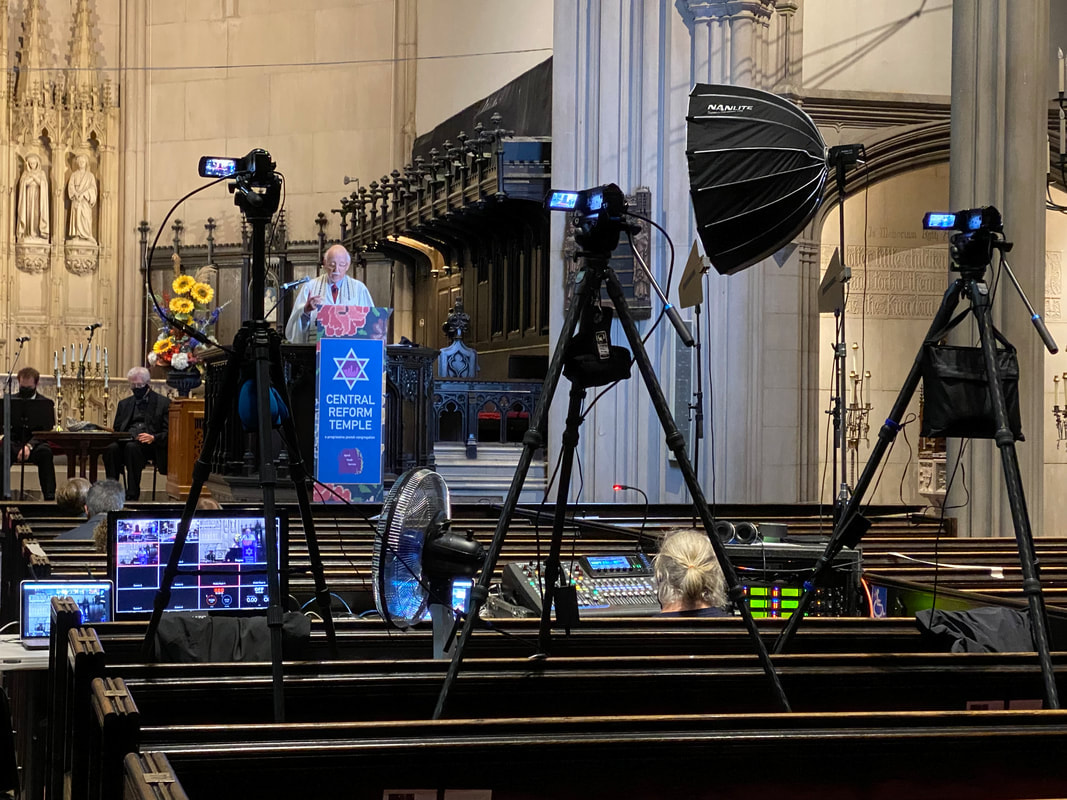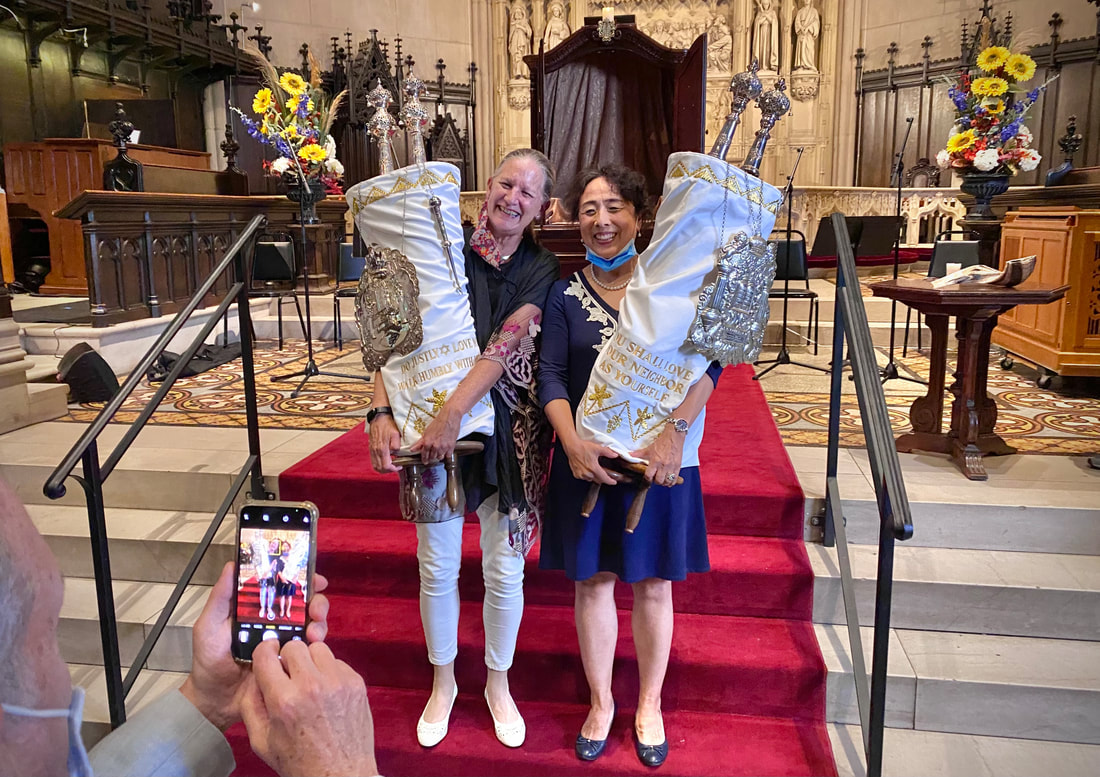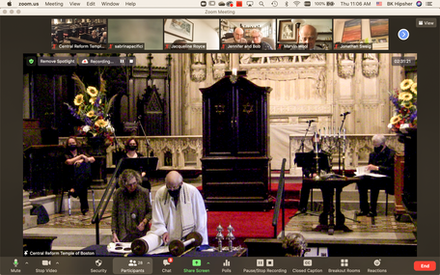High Holy Days
A Message From Rabbi Dr. Michael J. Shire
Central Reform Temple is a special congregation with a unique covenant partnership with Emmanuel Episcopal Church, whose sacred spaces we share together. We invite all to come home to their Jewish family at the High Holy Days - whether friends, relatives, or new connections made as we pray together in our magnificent sanctuary. Raise your voice in song and words throughout this sacred time. We begin the penitential period in the Hebrew month of Elul with Selichot. This meditative and beautiful service prepares us for the coming season, with its familiar melodies of the High Holy Days and ancient and contemporary liturgy.
Rosh Hashanah services, on the evening and morning of the first day of the Jewish New Year, are a time of celebration, but also of reflection and renewal. To awaken us to the New Year, we listen to the call of the ancient ram’s horn – the Shofar. It is a rare opportunity to take time away from our busy lives and evaluate our best selves. We hear rousing melodies, written especially for these days. In the morning, we read the challenging, yet enduring narrative of the Binding of Isaac, the traditional reading for Rosh Hashanah. On Rosh Hashanah afternoon, we begin the process of repentance with the ritual of Tashlich, literally casting our symbolic failings - reflections on our worst selves -into a flowing body of water - the Charles River.
During the Ten days of Repentance between Rosh HaShanah and Yom Kippur, tradition invites us to seek forgiveness from others for any missteps of deed, word, or omission that we might have committed this past year. That way, we come to Yom Kippur free of burdens of guilt and self-recrimination.
Yom Kippur commences with the poignant playing and singing of Kol Nidre in front of the open Ark. It is a moment that has entranced hundreds of generations of Jews over thousands of years in all lands. We stand at Kol Nidre, ever mindful of those who came before us, while we enact the same rituals marking this new year. Yom Kippur day focuses on personal confession and atonement and offers a quiet, sacred time for reflections of the Divine in our lives, with words and music for the soul.
The afternoon Yom Kippur reading of the reluctant prophet Jonah who runs away from his responsibilities, is followed by discussion of this powerful story of human frailty. We conclude Yom Kippur with Yizkor, the remembrance of those we have loved and lost. As the gates of evening fall, we end the day with Neilah, the closing service, and a final blast of the Shofar. We separate from the High Holy Days with Havdalah, breaking the fast together with challah and wine.
As the New Year is fully announced and celebrated, during the next week, it is time to build the CRT Sukkah on Newbury Street and share it with our neighbors. We celebrate our spiritual home-coming with the Sukkot festival. We hope you will make Central Reform Temple your home for the High Holy Days.
All guests must pre-register to ensure everyone’s safety.
Central Reform Temple is a special congregation with a unique covenant partnership with Emmanuel Episcopal Church, whose sacred spaces we share together. We invite all to come home to their Jewish family at the High Holy Days - whether friends, relatives, or new connections made as we pray together in our magnificent sanctuary. Raise your voice in song and words throughout this sacred time. We begin the penitential period in the Hebrew month of Elul with Selichot. This meditative and beautiful service prepares us for the coming season, with its familiar melodies of the High Holy Days and ancient and contemporary liturgy.
Rosh Hashanah services, on the evening and morning of the first day of the Jewish New Year, are a time of celebration, but also of reflection and renewal. To awaken us to the New Year, we listen to the call of the ancient ram’s horn – the Shofar. It is a rare opportunity to take time away from our busy lives and evaluate our best selves. We hear rousing melodies, written especially for these days. In the morning, we read the challenging, yet enduring narrative of the Binding of Isaac, the traditional reading for Rosh Hashanah. On Rosh Hashanah afternoon, we begin the process of repentance with the ritual of Tashlich, literally casting our symbolic failings - reflections on our worst selves -into a flowing body of water - the Charles River.
During the Ten days of Repentance between Rosh HaShanah and Yom Kippur, tradition invites us to seek forgiveness from others for any missteps of deed, word, or omission that we might have committed this past year. That way, we come to Yom Kippur free of burdens of guilt and self-recrimination.
Yom Kippur commences with the poignant playing and singing of Kol Nidre in front of the open Ark. It is a moment that has entranced hundreds of generations of Jews over thousands of years in all lands. We stand at Kol Nidre, ever mindful of those who came before us, while we enact the same rituals marking this new year. Yom Kippur day focuses on personal confession and atonement and offers a quiet, sacred time for reflections of the Divine in our lives, with words and music for the soul.
The afternoon Yom Kippur reading of the reluctant prophet Jonah who runs away from his responsibilities, is followed by discussion of this powerful story of human frailty. We conclude Yom Kippur with Yizkor, the remembrance of those we have loved and lost. As the gates of evening fall, we end the day with Neilah, the closing service, and a final blast of the Shofar. We separate from the High Holy Days with Havdalah, breaking the fast together with challah and wine.
As the New Year is fully announced and celebrated, during the next week, it is time to build the CRT Sukkah on Newbury Street and share it with our neighbors. We celebrate our spiritual home-coming with the Sukkot festival. We hope you will make Central Reform Temple your home for the High Holy Days.
All guests must pre-register to ensure everyone’s safety.
Sukkot
The Biblical Harvest Festival of Sukkot, which is celebrated the week following Yom Kippur, is a special time at Central Reform Temple. In 2009, we built our first public Sukkah, the ancient “tabernacle” recalling both the harvest and the wanderings of our ancestors in the desert. Erected at 15 Newbury Street in front of our Temple, this beautiful symbol has become a popular expression of Jewish tradition in the greater Boston community. Thousands of passersby stop and read the explanatory signs about the holiday, and enter the fruit and branch-covered structure. It is a vivid spiritual presence affirming the beauty of nature in the middle of the city! Check the CRT Events Calendar for up to date information.
Purim
Like our Chanukah celebration, our observance of Purim seeks to offer an adult experience of this holiday. The Feast of Esther is an important affirmation of both the role of women in Jewish history, and the triumph of justice over oppression. We read the Megillah, the Scroll of Esther, on the Shabbat closest to the festival, and study its many levels of contemporary challenge….and of course we all enjoy the traditional treat of “hamantaschen” pastries as well!
Passover
Our Temple family gathers on the Second Night of Passover to share in the joy and inspiration of the Seder. We retell, relive and reaffirm the timeless messages of freedom and liberation in our people’s ancient story of deliverance from slavery. Of course, we also share a wonderful dinner together, with all of the beloved dishes.
American Holidays
A major principle of the American Reform tradition is our affirmation of the special place that our country’s history and ideals hold in our lives as American Jews. The major celebrations of our national life are all marked at Central Reform Temple, with special readings, prayers and music during our Sabbath worship closest to their observance: the themes of Martin Luther King, Jr. Day, President’s Day, Memorial Day, Juneteenth, Independence Day and Veteran’s Day are all linked to our Jewish faith and values.




